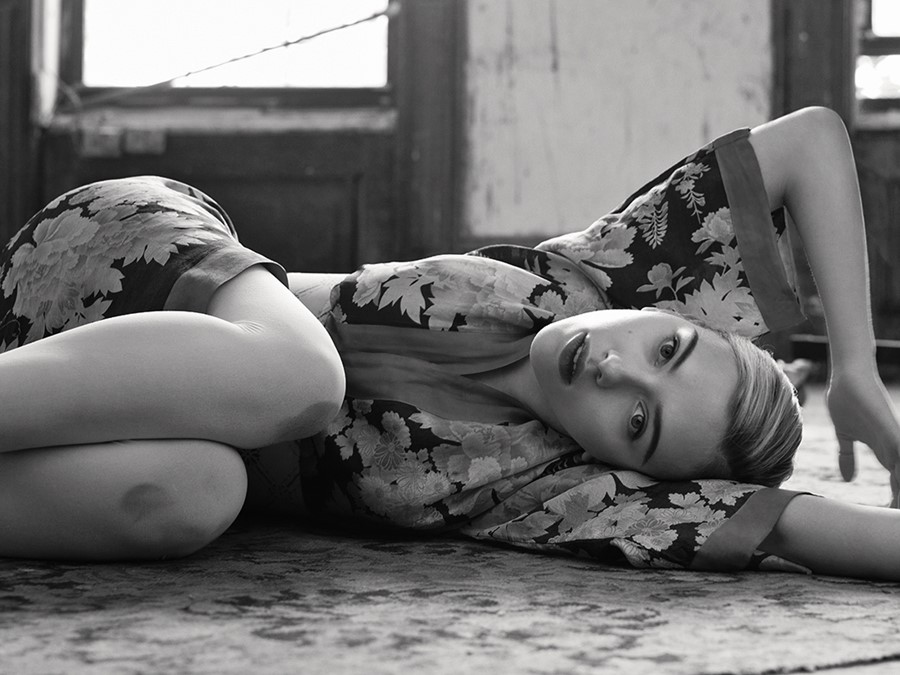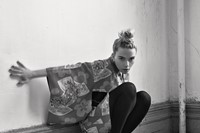Scarlett Johansson and AM Homes collude in a unique interview for AnOther Magazine A/W08; one that combines truth, fabrication, surrealism, wishful thinking and a lot of driving
AnOther has always found ways around the conventions of the standard interview structure, and for the A/W08 issue, the stakes were high. Lost in Translation star Scarlett Johansson was breaking through as one of the most extraordinary young talents in years, starring as the focus of innumerable straight profile pieces and glossy shoots. So we did something entirely different, commissioning celebrated author AM Homes to take the actress on a conversational adventure that flits between the strange, the true and the absurd. Read on for the first instalment of this entirely unique portrait of one of cinema’s brightest stars, alongside a orientally inspired shoot by Craig McDean.
Where does this all begin? Let’s just say it was Jefferson’s idea.
Jefferson Hack, the wily wizard behind the curtain of this whole operation. He cooks up this idea that Scarlett Johansson and I should go on a road trip – it’s an American Tradition, a rite of passage, think of Kerouac’s On The Road. With barely an arm twist, Jefferson gets us both to agree – he sends us an email, “Start your engines,” and “call if you get lost along the way.” Within seconds Scarlett emails back, “I thought the whole point was that we’re supposed to get lost.” In my head I hear a Chet Baker soundtrack. An hour later Scarlett sends me a web link for a youth hostel near Niagara Falls, New York. The only Niagara I know is a very good brand of spray starch – keeps your shirts nice and crisp. I click the link, all the while wondering – is she kidding? The HI-Buffalo Niagara at 667 Main Street, Buffalo, New York, 14203, USA, advertises: 24 hour hot showers, no curfew, lockers in dorms, washing machines.
There are photos of the communal kitchen and rooms of multiple wooden bunk beds. The romance of sleeping on bunk beds in a room of strangers is something I left behind at summer camp. I’d do it only in a national disaster – for example a tidal wave sweeps through New York and I’m given a boat ride out and put up by an army somewhere in New Jersey, because there is no Four Seasons, no Claridges, no Montalambert. But what about Scarlett; how do I tell if she’s serious? Do celebrities have a sense of humour? I email back – “Scarlett, I’m really busy on Niagara Falls day, what comes next?” She sends a photo of herself snapped in the garden of the Bel Air hotel in Beverly Hills, Scarlett in a beautiful white silk dress feeding the hotel swans. And I like the Bel Air, they make a good Arnold Palmer (a combination of iced tea and lemonade). “Okay,” I write back, “But we need a plan.” “I have maps,” she says. When I ask how long she thinks we’ll be gone she says, “Lets play it by ear.” I’m a little nervous, this is all a kind of a construction, something we’re doing so that I can write this article about Scarlett, but we’re not REALLY going cross-country are we? I express my anxiety to Jefferson, who says, “Be easy going, the more relaxed you are the more open she’ll be.” “Fine,” I lie. Maybe Scarlett and I can just take a taxi and drive around Manhattan, she can show me where she grew up, where she went to school, and tell me how she became SCARLETT JOHANNSON, an ever rising icon co-starring in the latest Woody Allen film, a singer with a disc of Tom Waits’s covers, David Bowie singing back up and Salman Rushdie burrowing into her neck on the music video. (The album produced by Dave Sitek of TV On The Radio also features one original composition “Song for Jo”.)
When did I first notice Scarlett? It goes back to The Horse Whisperer; she was engaging at 14 under Robert Redford’s direction. Then there was Terry Zwigoff’s alienated adolescent, Ghost World, at 16, a little bit more interesting. But it was Lost In Translation at 19 that got the gold.
Her performance was about a young woman coming to consciousness, transitioning between being a girl and a woman and in the end it also clearly marked the transition between Johansson being an up-and-coming actress to her being a star. And then there was the very painterly (no pun intended) Girl with the Pearl Earring where her features with their genetic Dutch/Jewish roots added a certain something and where her performance was entirely about performance, about a kind of stillness and surrender – Scarlett in the role of Griet, a young woman living in the Netherlands in the 1660s, maid and then muse to the painter Johannes Vermeer – and from there on to becoming a regular in Woody Allen’s odd ensemble, and so it goes. I am thinking about Scarlett while I am home packing – pillow for my bad back, snacks, car charger for the phone, tape recorder, tapes, batteries, note book, pajamas – is the magazine paying for two hotel rooms or are we sharing?
As I pack the contents of my apartment into a suitcase and a carry-on, I wonder is it still called a “carry-on” even if you’re not going on a plane? Scarlett leaves a message on my cellphone: “I’m at Whole Foods picking up snacks, you’re not Vegan are you? See you in 20 minutes.” I wonder what kind of car she has; a Honda or some kind of eco-friendly hybrid? Or maybe it’s an enormous mini-van with a third row of seats and we’ll be throwing all our candy wrappers in the back, or maybe she doesn’t really drive at all and she’ll arrive in a long black limo with a man at the wheel. Scarlett pulls up in a red Mini Cooper. She looks normal for a movie star. Let’s face it, Scarlett is a pro, she’s got a nice small suitcase in the back and up front in what’s about to become my seat one of those mega purses that’s like an enormous hammock. “Oh sorry,” she says moving the purse. I close the door and buckle up. “I like your car,” I say. “It’s not my car. It’s a rental,” she says, stepping on the gas, giving me momentary mild whiplash. How do I do this? Do I turn on a tape recorder, do I record the sound of the tyres on the highway? “So,” I say, “Where are we going?” “How about leaving that to me?” she says. How about the fact that I hate surprises and despite that she’s a movie star I suddenly feel kidnapped. “I’m thinking Nyack – it’s 30 minutes from NYC, we could get a coffee, talk for an hour and then head home?” She shakes her head. “Bennington, Vermont – there’s a good Cheeseburger place?” She shakes her head. “Okay, the Eastern Shore of Maryland, Chesapeake Bay?” “Nope,” she says, laughing. I look over at Scarlett and think, this is odd, but I’m doing a magazine profile and there she is in PROFILE – i.e. she can’t turn her head to talk, she’s got to keep her eyes on the road. In profile she’s the young woman other young women want to be, and she’s the kind of a girl a guy might think he’d have a chance with because she’s not a “perfect” beauty but she is very much a natural beauty. The late afternoon light sweeps across her face and her skin picks it up; there’s a translucence about Scarlet, a subtlety which is what acting is all about, the flicker of the eye, the deft turn of the head, and the fact that she’s got a great speaking voice and a curvy body, and exudes confidence. While she’s driving, I’m dashboarding – i.e. writing while in the car, I think of Nabokov’s notes on index cards, Sam Shepard writing plays while at the wheel. I am taking notes, my laptop heating my knees while Scarlett appears to be drag-racing tractor-trailers on the New York State Throughway. So we start talking, and somehow I begin with Scarlet’s grandmother, who I had recently read something about performing in a concert for seniors. I’m a sucker for grandmothers - my own died suddenly at 99. I click the record button.
SJ: My grandmother's parents were from New York, so I’m from a long line of New York, row housing. She moved to Denmark in the 1970s because it was liberal and clean and they had great social programmes.
AM: Did your mom move with her?
SJ: My mom was 19 or 20 when they moved, she married my father when she was 20 and they lived in Denmark for a couple of years then moved back to New York. My father was from Copenhagen, he was born and raised there.
AM: A very different persona than…
SJ: Than my Jewish mother from Brooklyn?
AM: Don't you think?
SJ: Yeah, totally different, although there are certain similarities as far as the ironic sense of humour goes, obviously Scandinavian sense of humour is extremely dry. My dad is very funny. He and my mom they share their sense of humour. My parents got divorced, well they separated about ten years ago, but I think that's really what kept them together for so long. My grandmother is like a little firecracker, she’s so cute. It’s an interesting perspective to be friends or have an older person in your life. It's wonderful. I treasure my relationship with her. It's incredible to think about what she has actually lived through. She must've been born around 1922 or something and then when you think how much has changed, what she's lived through, it's incredible. I wonder sometimes if we're in some kind of stalemate now. I wonder if years from now when I'm talking to my grandchildren I'll be like, ‘Everything's pretty much the same just worse.’
AM: The technological and scientific progress happening now is a lot like it was at the turn of the century, you know with the whole …
SJ: Yeah , so why are we socially disintegrating?
AM: When you think about change what do you think about?
SJ: I'm really inspired when I watch Barack Obama speak. I think the kind of change that he's talking about isn't like, ‘Let's get those Republicans out of there and take over and polarise this society.’ He's talking about a change that’s from the bottom up where the people are proactive and proud and excited and can do well for themselves and can start small businesses and support their families and follow their dreams. And really have a land of opportunity for people.
AM: Do you feel a sense of social responsibility? That we each are supposed to be doing something in our communities or in our worlds?
SJ: I think that it's hard for people to be active in their community and politically active when they are so freaked out about how they are going to feed their children or take care of a sick parent, problems that are completely all consuming. I really feel that, yes of course it's important for people, it's personally fulfilling as well, – it feels good to be part of the community to better your community. But people are freaked out and really it just feels like a depressing time. What I do feel when I watch Obama speak? That he is incredibly intelligent, which has unfortunately been misconstrued by certain media sources as being elitist.
AM: Can a person who has a public career, have a private life?
SJ: I think you can have a private life, I mean I certainly have a private life.
AM: How?
SJ: I've been working in the industry for 15 years so I feel like in a sense that's allowed me a longer time to adjust to it, and also I don't live a crazy sensational life. I'm fortunate in that way, I have a very supportive family, I think that's a major part of it. My family's very normal and not very phased by it all. They've been dealing with it for such a period of time.
AM: Where do you like to go when you’re not home?
SJ: I like to travel around the country. I love driving and I love travelling around the States and seeing the terrain change. We live in such a beautiful country. Sometimes you forget somehow, you're all wrapped up in the things we've been talking about, you don't realise that there's all these incredible national parks, so many places to see. It's great, I drive as much as I possibly can.
AM: What do you like about driving?
SJ: I like to listen to music and I like to get out when I feel like it and go, ‘Oh look it says it's the best hot chocolate in America.’
The interview between AM Homes and Scarlett Johansson contained in this story took place in New York City in June 2008. The road trip printed in bold is purely fictional, a fabrication by the author in response to the interview. For the full article, and for all 25 issues in the AnOther Magazine archive, visit Exact Editions.



